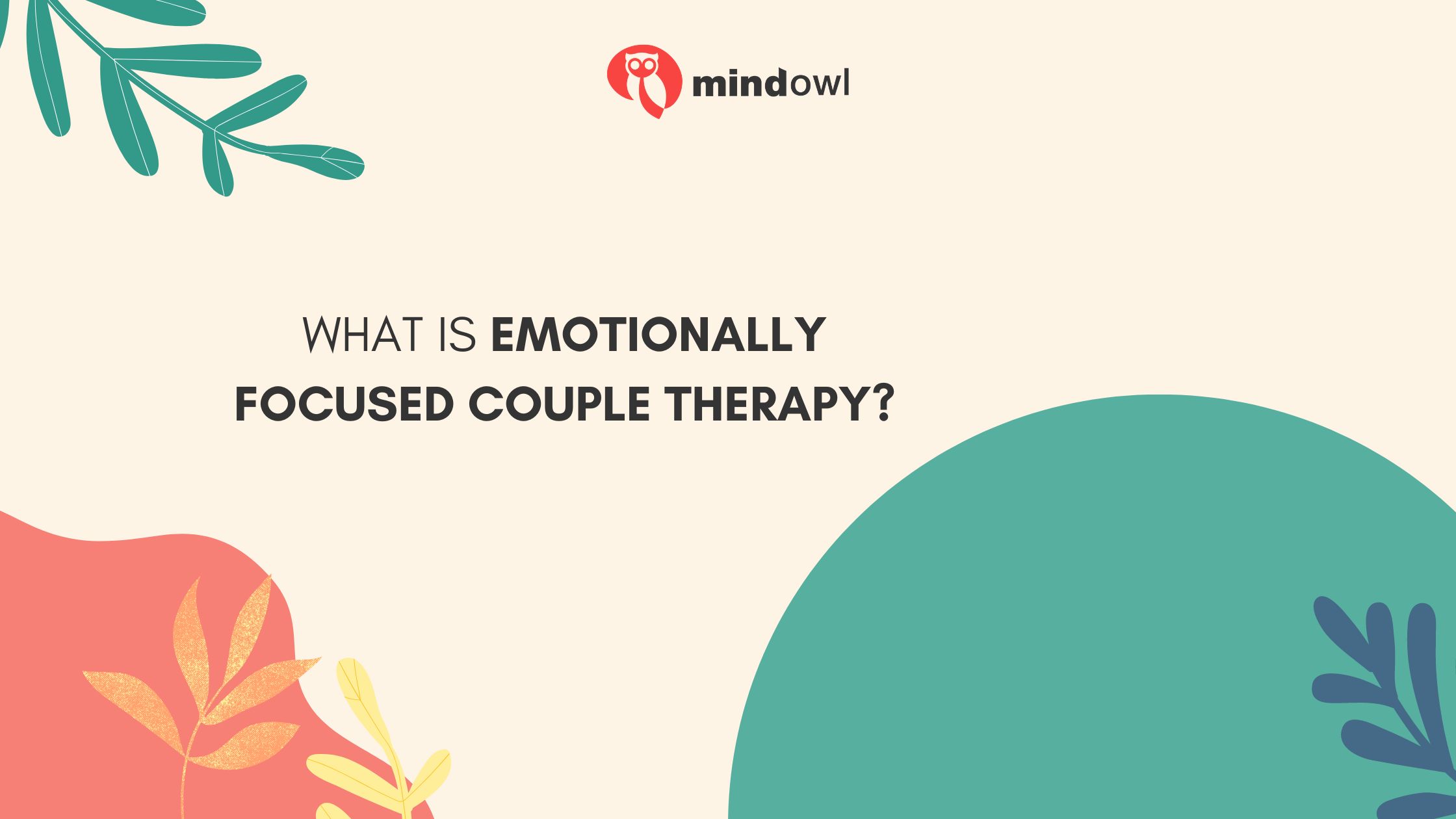
Struggling to connect with your partner can feel like a lonely battle. Emotionally Focused Couple Therapy, or EFCT, is designed to strengthen the emotional bond between partners. This article delves into how EFCT paves the pathway for deeper connection and understanding within relationships.
Stay tuned; it’s time to rediscover closeness.
Key Takeaways
- Emotionally Focused Couple Therapy (EFT) helps couples create strong emotional bonds by changing patterns in their relationship.
- EFT is for any couple facing challenges or wanting to communicate better and can work quickly, often in 8 to 20 sessions.
- Qualified EFT therapists use techniques like empathetic listening and role – play to help partners understand and support each other’s feelings.
- Couples learn how to deal with tough emotions without fighting and find ways to feel safe and connected again with each other.
- To start EFT, you need a qualified therapist. You can prepare by being ready to share feelings openly during therapy sessions.
Understanding Emotionally Focused Couple Therapy (EFT)
-154192526.jpg)
Emotionally Focused Couple Therapy (EFT) is a structured approach to couples therapy that focuses on creating secure attachment bonds between partners. It aims to help couples understand and reframe negative interaction patterns, ultimately fostering a more secure and satisfying relationship.
What is EFT?
EFT stands for Emotionally Focused Therapy. It is a type of therapy that helps couples strengthen their emotional connection. This therapy is based on the idea that our emotions play a big role in our relationships and can lead to better understanding between partners.
EFT looks at the patterns in your relationship that make you feel stuck or unhappy.
An EFT therapist works with couples to explore these patterns and helps them find new ways to connect and support each other. They use special techniques to help partners talk about their feelings, listen to each other, and build trust.
The goal is to create a stronger bond that makes both people feel secure and loved.
How does EFT work?
EFT helps couples understand and change their emotional responses. It focuses on the feelings between partners. The goal is to make these feelings stronger and more secure. Therapists guide couples through their fears and needs.
They help them talk about tough emotions without fighting.
Couples learn to be better listeners and supporters for each other in EFT. They find new ways to solve problems together. This therapy brings back warmth and safety into relationships by fixing the emotional bond that might have gone weak.
Who is EFT for?
EFT is for any couple feeling the strain in their relationship. Maybe partners feel they have lost that close bond, or they argue a lot and can’t break out of it. If one person feels alone even when with their partner, this therapy could help them reconnect.
It’s also great for those who want to understand each other better and communicate in healthier ways.
Couples experiencing big life changes might find EFT valuable too. Whether dealing with a new baby, moving houses, losing jobs or coping with health issues—these stresses can shake up a partnership.
EFT offers them new ways to support each other through tough times and build a stronger team together.
Why Choose EFT for Couples Therapy?

The benefits of Emotionally Focused Couple Therapy (EFT) include its effectiveness in helping couples improve their relationship, addressing a wide range of problems, and providing a short-term solution to distress.
With the use of EFT, couples can develop new solutions and create a more secure and healthy relationship.
Benefits of EFT
Emotionally Focused Therapy, or EFT, is great for couples who want to feel closer. It helps them understand their feelings and get better at handling them together.
- EFT creates a safe space for both partners to share their deepest emotions. This can make each person feel heard and valued in the relationship.
- It’s based on attachment theory, which means it helps couples understand why they need to be close and depend on each other.
- The therapy often leads to stronger bonds between partners. They start feeling more secure and supported when they are with each other.
- EFT is a good choice when couples face tough times because it teaches them how to sort through their troubles as a team.
- If people feel stuck in negative patterns, like arguing a lot, EFT shows them new ways to break free and move forward in healthier ways.
- Many find that after going through EFT, they’re happier with each other than before. Their relationship feels better overall.
- This type of therapy doesn’t just focus on talking; it includes exercises that bring partners closer both emotionally and physically.
- EFT is not just for small problems. It can help even when things seem very bad between partners.
Effectiveness of EFT
EFT has shown to be a strong tool in healing distressed relationships. It helps couples understand how their negative emotions and fears of abandonment can lead to trouble. By managing these feelings, partners become more open and responsive to each other.
This leads to better communication and stronger bonds.
Many studies prove that EFT works well for many couples over a short time, usually between 8 and 20 sessions. Couples learn to deal with emotional aloneness and change bad patterns of interacting.
With EFT’s help, they start feeling safe again in their relationship. They find ways to meet each other’s needs for closeness and support.
What problems can EFT treat?
EFT can help couples who face many tough challenges in their relationship. Some have deep emotional wounds, like those caused by post-traumatic stress disorder (PTSD). Others might feel really cut off from each other, thinking their bond is too broken to fix.
EFT offers them a way back to connection and safety together.
For partners drowning in fights or silence, emotion-focused therapy lights the path toward understanding and closeness. It works on issues like trust problems, poor communication, and feelings of distance between partners.
This therapy helps people share their true feelings and needs to rebuild what’s been lost or hurt.
Now let’s look into the techniques involved in EFT that make such healing possible.
The EFT Process
EFT uses techniques such as identifying attachment needs, exploring patterns of interaction, and creating a sense of safety to help couples overcome relationship distress. To learn more about how the EFT process can benefit your relationship, keep reading!
Techniques used in EFT
Emotionally Focused Therapy, or EFT, helps couples talk about their feelings in new ways. It uses special techniques to build stronger bonds.
- Empathy-based techniques: These help partners understand each other’s emotions better. Therapists listen and respond to feelings, so everyone feels heard.
- Empty chair technique from Gestalt therapy: A person talks to an empty chair pretending their partner is there. This can help express hidden feelings.
- Relational methods: These focus on how partners act with each other. The goal is to change bad patterns into caring ways of being together.
- Practicing methods: Couples try out new ways of talking and listening during sessions. They learn to support each other emotionally.
- Action tasks: Partners get specific things to do outside of therapy. These tasks help them use what they learn in real life.
- Task reprocessing: After acting on the tasks, couples talk about how it went during therapy. This helps them understand things better and grow closer.
Goals of EFT
The main goal of Emotionally Focused Couple Therapy (EFT) is to help couples re-organise their emotional responses and create stronger bonds. EFT aims to guide individuals in recognising and expressing their emotional needs within the context of their relationship, leading to an improvement in relational bonds.
By addressing attachment-related insecurities and transforming maladaptive emotional responses, EFT facilitates the development of emotional intelligence and awareness in couples, ultimately resulting in more secure and emotionally responsive interactions.
Through EFT, distressed couples can aspire towards a deeper understanding of each other’s emotions, leading to improved communication and a greater sense of connection. This therapy approach emphasises creating adaptive emotional connections while addressing patterns that hinder relational growth.
As a result, EFT seeks to facilitate the creation of secure and enduring relationships for those who engage with the therapy process.
Typical sessions
After establishing the goals of emotionally focused couple therapy (EFT), the typical sessions involve structured conversations where the therapist helps partners understand and express their emotions.
During these 8 to 20 sessions, couples explore their patterns of interaction and work towards creating more secure bonds. The therapist guides them through the three stages of EFT, which include de-escalation, restructuring interactions, and consolidation.
Through this process, they move through nine specific steps that help them identify negative communication cycles and build new ones based on emotional responsiveness.
Within each session, therapists use techniques such as empathetic listening and reframing to foster understanding between partners. They help couples identify attachment needs and emotions underlying their conflicts while providing a safe space for expression.
Choosing an EFT Therapist
When choosing an EFT therapist, it’s important to look for someone with the necessary qualifications and training in Emotionally Focused Couple Therapy. Expect a therapist who can provide a safe and supportive environment while guiding you through the process of healing and growth in your relationship.
Qualifications and training
Therapists who practise Emotionally Focused Couple Therapy (EFT) undergo specialised training in attachment theory. This equips them to address a wide range of relationship concerns and effectively help couples improve their emotional bond.
EFT therapists are licensed mental health professionals who have additional training in this evidence-based approach, making them qualified to guide partners and family members towards healthier, more secure relationships.
To ensure the best possible outcome, it’s important for individuals seeking EFT therapy to find a therapist with the necessary knowledge and skills. When looking for an EFT therapist, consider their certification from recognised institutions like the International Centre for Excellence in Emotionally Focused Therapy (ICEEFT).
By choosing a qualified and certified therapist, clients can confidently seek help in strengthening their relationships through emotionally focused therapy.
What to expect in a therapy session
In an emotionally focused couple therapy (EFT) session, both partners can expect a safe and supportive environment where the therapist guides them to explore their emotions and communication patterns.
The focus is on understanding each other’s feelings and experiences within the relationship. Through active listening and empathetic engagement, the therapist aims to uncover underlying emotional dynamics that may be contributing to conflict or disconnection.
Sessions typically involve identifying and expressing core emotions such as joy, surprise, shame, fear, anger, and sadness in relation to specific relationship situations.
How to find an EFT therapist
To find an EFT therapist, you can follow these steps:
- Start by searching online for “EFT couples therapy near me” to locate practitioners specialising in emotionally focused therapy for couples.
- Look for therapists who have received training and certification in EFT, as this ensures they have the necessary expertise.
- Check the therapist’s qualifications and experience to ensure they have a background in providing therapy for couples and have dealt with issues like addiction, depression, or chronic health issues.
- Seek out recommendations from friends, family, or online communities for therapists who offer effective emotionally focused therapy for couples.
- Before committing to a therapist, it’s essential to enquire about their approach to EFT and how they tailor the therapy to each couple’s specific needs.
- Consider factors such as the therapist’s location, office hours, and whether they offer virtual sessions if travel is challenging.
- Once you’ve found potential therapists, reach out to them and schedule initial consultations to discuss your situation and see if there’s a good fit between you and the therapist.
Getting Started with EFT
To get started with EFT, couples can take the first steps by finding a qualified therapist and preparing for their sessions. There are also self-help resources available for those who want to explore EFT on their own.
First steps in EFT therapy
When starting EFT therapy, the first step is to find a qualified therapist who has training in Emotionally Focused Couple Therapy (EFT).
- Schedule an initial consultation with the therapist to discuss your needs and goals for therapy. This consultation helps both you and the therapist determine if EFT is the right approach for your relationship.
- Complete any paperwork or assessments provided by the therapist to help them understand your relationship dynamics and individual experiences.
- Prepare to openly share your emotions and experiences with the therapist during sessions as EFT focuses on exploring and addressing emotions within the relationship.
- Be open to exploring patterns of communication and interaction within your relationship, as understanding these patterns is crucial in EFT.
- Commit to attending sessions regularly and actively participating in the therapeutic process to experience the benefits of EFT.
Preparing for sessions
- Create a Welcoming Atmosphere: Start by greeting the couple warmly, creating a safe space where they feel comfortable expressing their emotions.
- Establish Intentional Focus: Encourage the couple to be present and intentional from the start, fostering an environment primed for emotional exploration and change.
- Encourage Open Communication: Foster open dialogue by inviting both partners to share their thoughts and feelings without judgement.
- Cultivate Emotional Awareness: Help the couple recognise and understand their individual emotional experiences, laying the groundwork for deeper connection.
- Set Clear Objectives: Collaborate with the couple to define specific goals for therapy, providing a roadmap for progress and improvement in their relationship.
- Instill Hope and Optimism: Convey confidence in the effectiveness of EFT and encourage the couple to approach therapy with a hopeful mindset.
- Normalise Emotional Expression: Assure the couple that embracing and expressing emotions is an integral part of the therapeutic process, promoting vulnerability and connection.
- Build Trust: Establish trust through empathy, active listening, and genuine concern for their well-being, creating a foundation for meaningful therapeutic work.
Self-help resources for EFT
Looking to take control of your relationship’s emotional dynamics? You can access self-help resources for Emotionally Focused Couple Therapy (EFT), including treatment manuals, training resources, measures, handouts, and worksheets.
These materials can provide invaluable support in understanding EFT principles and applying them to your relationship. Whether it’s reconnecting with your partner or addressing emotional barriers, these self-help resources offer practical tools for couples seeking to enhance their connection and intimacy.
Furthermore, exploring these resources can empower you to proactively engage with the core concepts of EFT. By delving into these materials and exercises designed specifically for couples, you’ll be equipped to navigate and address the underlying emotions that impact your relationship dynamics effectively.
Conclusion
In conclusion, Emotionally Focused Couple Therapy (EFT) is a well-structured approach to nurturing healthy relationships by addressing emotional dynamics. Founded on attachment theory, it aims to transform negative interaction patterns within relationships.
With its focus on emotions and communication, EFT offers a proven method for strengthening the bond between couples in a relatively short time. Couples can benefit from EFT’s emphasis on emotional understanding and effective communication strategies, leading to more fulfilling and lasting relationships.
FAQs
1. What is Emotionally Focused Couple Therapy?
Emotionally Focused Couple Therapy, or EFT, is a special kind of therapy that helps couples with their feelings and connections to each other.
2. Who started Emotionally Focused Couple Therapy?
Sue Johnson and Leslie Greenberg developed this therapy in the 1980s for couples to fix problems in their relationships.
3. Can EFT help if one partner feels they have lost their connection?
Yes, EFT can help both partners understand why they feel distant and work together to get back a strong bond.
4. Is Emotionally Focused Couple Therapy just for married people?
No! Whether you are married or not, this therapy is useful for all sorts of couples who want to make their relationship better.
5. How long does it usually take to complete EFT?
EFT is short-term therapy that focuses on fixing specific issues quickly so couples don’t need many sessions outside of the therapy office.
6. Does training exist for therapists who wish to use EFT?
Absolutely! Therapists can get training at an international center or through programs that offer education on using emotion-focused methods effectively.
MindOwl Founder – My own struggles in life have led me to this path of understanding the human condition. I graduated with a bachelor’s degree in philosophy before completing a master’s degree in psychology at Regent’s University London. I then completed a postgraduate diploma in philosophical counselling before being trained in ACT (Acceptance and commitment therapy).
I’ve spent the last eight years studying the encounter of meditative practices with modern psychology.

